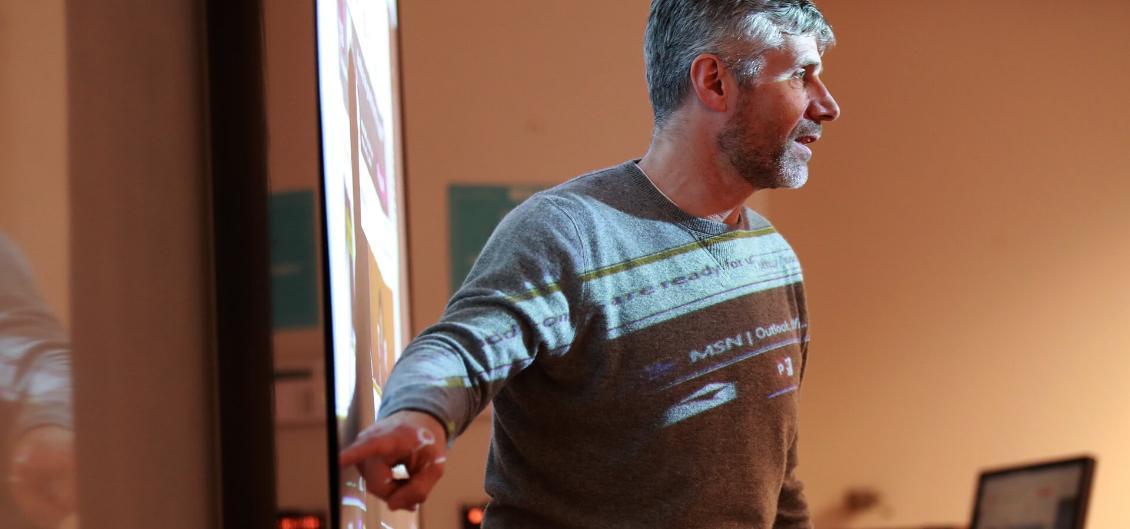
Gareth Green

Gareth Green, PhD
Gareth Green started as a full-time academic in 1995. He joined the Albers faculty in 2000 as a Visiting Assistant Professor. In 2001, he migrated from that visiting position to a tenure track line as Assistant Professor of Economics. In 2019, he was promoted to Professor of Economics. He served as Program Director of the Business Analytics program from 2018 to 2020.
When asked a few years ago how he found himself in economics, Green talked about how he stumbled on it in university. 'I ended up taking a course in Environmental Studies, and economics kept coming up in this class which was kind of surprising to me.'
'It was case studies about multiple use resources: Okay, how do we use the Columbia River? We deal with flood control, agricultural water supply, look at the environmental benefits for salmon, hydro-electric power from the dam.'
'So there's all these different uses, and the economics came in when looking at the balance between those uses. There were a bunch of cases like that and I was thinking, "Wow, economics applies to the environment and I'm really interested in that!"'
Courses Gareth Green has Taught

Scholarship
Most of Green’s research has focused on environmental economics issues and economics pedagogy, although more recently it has tracked with his teaching in the business analytics programs.
He has 19 journal articles in his portfolio of scholarship, and his publications have appeared in leading journals such as the Journal of Economic Education, Resource and Energy Economics, and the American Journal of Agricultural Economics. He has also presented many conference papers and in 2003 received the Outstanding Journal Article award from the Journal of Agricultural and Applied Economics.
Service
Green currently serves as Director of the Business Analytics programs and has played a critical role in the development and implementation of each – Master of Science in Business Analytics (MSBA), the Business Analytics (BUAN) concentration, and the Online MSBA.
Green served as chair of the Department of Economics for six years (and for one year was also acting chair of the Department of Finance) and served on the President’s Applied Data Science Taskforce, including work this year on follow-up initiatives such as a campus wide undergraduate minor in Applied Data Science.
All of this has been facilitated by his collegiality and supportive leadership style. As a result, he leaves a significant legacy in terms of the university building out its applied data science programs, and also with his leadership role in the Department of Economics.
For us, Gareth’s distinguishing trait is his passion for student learning. You have to sit in his classroom or office, better, watch him 'draw' on any nearby wall in order to explain where and why students are having difficulty. In these settings you see a rare passion and an ability to create genuine mastery. Fortunately, decades of SU students benefitted from that gift.
Anonymous colleagueAll of us believe Gareth is too young to be retiring, but we have to get over it! We are particularly indebted to him for the contributions he has made in establishing our Business Analytics programs, including serving as Program Director, but we also cannot forget his excellent leadership as department chair.
Joe Phillips Dean, AlbersJohn Bean, Emeritus Professor of English, talks about Gareth Green
'While Gareth’s Albers colleagues are probably recalling funny or inspirational stories to commemorate his retirement, when I think of Gareth I think of the difference between these two assignments:
Algorithmic (well-structured) problem asking for right answer
'Calculate the own- and cross-price elasticities of demand for turkey based on the following demand curve, Q = 23 – 2PT + 1.5PC. The price of turkey is PT = $2.50 per pound, the price of chicken is PC = $2 per pound and the quantity of turkey is 21 thousand tons per year.'
'Questions students seldom ask:
- Why use this particular demand curve? Where did this formula come from?
- How did they get these price and volume numbers?
- Who cares about the elasticity of demand for turkeys?
Argumentative (ill-structured) problem asking for claim with reasons and evidence
'Faced with budget deficits, Representative Smith is considering proposing an increased state gasoline tax as a new source of state revenue. She asks you to write a two-page recommendation memo for or against raising the gas tax based on your economic analysis of the potential revenue that could be raised through such a tax as well as on your evaluation of the pros and cons of the tax.'
'Questions this assignment forces students to ask:
- What algorithms/formulae/graphs from our course apply to this kind of problem?
- How do I find the data/numbers to plug into the formulae, construct the graphs, and do the calculations? How do I do the research?
- What would be the positive and negative consequences of an increased gas tax?
'From the perspective of the Scholarship of Teaching and Learning, Gareth’s “ill-structured problem” assignment advanced our study of how students progress from novice to expert.
'The assignment grew out of Gareth’s participation in an Albers Writing in the Disciplines workshop about ten years ago. The question under discussion was this: How do you teach beginning economics majors to think like economists?
'Gareth’s insight was that a series of algorithmic homework problems (standard for intermediate micro) did not promote expert thinking. Gareth provided the leadership spark for an interdisciplinary research team that included Gareth (and later Brian Kelly ) as teachers of intermediate micro, Dean Peterson in his assessment role through the oral exam in the senior capstone, Lynn Deeken as reference librarian, and me as a researcher in writing and critical thinking.
'What our research discovered is that integration of ill-structured problems into the homework mix in intermediate micro led to measurable improvements in students’ performance on Dean’s oral exam one or two years later. The story of this work is told in two articles in the Journal of Economic Education.
'Only a professor who loved teaching the way Gareth did and was committed to his students’ deep learning could have managed this major redesign of intermediate micro. What a joy in my life to have worked with Gareth and his remarkable colleagues. Thanks, Gareth!'